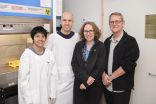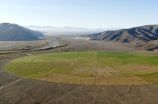(Press-News.org) Clinical trials for a dengue fever treatment could start within a year, following a discovery by University of Queensland scientists.
UQ's School of Chemistry and Molecular Biosciences Head Professor Paul Young said the researchers had identified similarities in how the body reacted to dengue virus and bacterial infections, in a finding that would allow them to re-purpose existing drugs.
"We have discovered that the dengue virus NS1 protein acts as a toxin in the body, in a similar manner to the way bacterial cell wall products lead to septic shock in bacterial infections," he said.
"For the past 20 to 30 years, researchers and pharmaceutical companies have been developing drug candidates to inhibit the body's damaging responses to these bacterial infections.
"So drugs are already available that have gone through phase three clinical trials.
Professor Young said mosquito-borne dengue virus was an increasing problem in tropical and sub-tropical areas, with more than 2.5 billion people in more than 100 countries at risk of infection.
Dengue virus is estimated to infect up to 400 million people globally each year. The World Health Organisation ranks it as the most important mosquito-borne viral disease in the world.
"Given increased international travel and the prospect of climate change extending the range of the dengue mosquito, more people will be at risk," Professor Young said.
Dengue typically causes a debilitating fever but can progress to potentially fatal dengue hemorrhagic fever and dengue shock syndrome.
Up to 500,000 cases of dengue hemorrhagic fever are diagnosed each year, with as many as 25,000 deaths.
"Despite this significant global health burden, no vaccine or drug has yet been licensed," Professor Young said.
PhD student Naphak Modhiran, who came from Thailand to work on the project, said last year Thailand suffered its worst dengue epidemic in more than 20 years.
"There were more than 200,000 cases and many deaths," she said.
"I hope our discoveries in the lab will translate to the patient bedside and eventually help those who suffer from dengue infection around the world."
The UQ research group's findings and the availability of drugs already developed for bacterial infections mean that clinical testing could begin in as little as one to two years.
Members of the UQ research team are Professor Paul Young, PhD student Naphak Modhiran, Associate Professor Kate Stacey and Dr Dan Watterson.
The research, conducted in UQ's School of Chemistry and Molecular Biosciences and the Australian Infectious Disease Research Centre, is published in Science Translational Medicine.
The work has been funded by the National Health and Medical Research Council.
INFORMATION:
US fans of the National Football League (NFL) and sports reporters assigned to specific teams have unrealistic expectations about how well their team will perform, finds new research from UCL and Oxford University.
The study, published in PLOS ONE, also reveals which teams are most liked and disliked, as well as which teams have the most optimistic fans.
The main results are from an April 2015 survey of 1,116 US-based NFL fans, who were asked to predict how many games their favourite and least favourite teams would win in the 2015 season. As each team plays 16 games ...
New research suggests that offering financial incentives for farming industries to mitigate the impact agriculture has on the environment, by reducing fertiliser use and 'sparing' land for conservation, for example, actually has a positive effect on critical areas such as greenhouse gas reduction and increased biodiversity.
It has been a point of contention whether such 'cash for conservation' initiatives succeed. For the latest study, researchers aggregated investment in environmental incentives at a national level for the first time, and, by comparing them to broad ...
COLUMBUS, Ohio - A new study suggests that changes in immune function can occur as long as five years before the diagnosis of a brain tumor that typically produces symptoms only three months before it is detected.
Using blood samples collected an average of 15 years before brain tumor diagnosis to analyze interactions between 12 allergy-related proteins, researchers looked at how those relationships differed between people later diagnosed with brain tumors and cancer-free controls.
Among people who were subsequently diagnosed with this brain tumor, called a glioma, ...
The Wilson Center's Science and Technology Innovation Program (STIP) is releasing a five-episode video series looking at the potential for additive manufacturing to transform how we build things - and what we need to do to fully realize this potential.
Beyond the Desktop explores how additive manufacturing could affect the fields of medicine, aerospace, space technology and more. Beginning Sept. 9, 2015, a new episode will be released each Wednesday through early October. Episodes will be posted on the Wilson Center homepage: https://www.wilsoncenter.org/3dprinting
Many ...
Researchers have shown for the first time that phytoplankton (plant life) in remote ocean regions can contribute to rare airborne particles that trigger ice formation in clouds. Results published this week (Wednesday 9 September) in the journal Nature show that the organic waste from life in the oceans, which is ejected into the atmosphere along with sea spray from breaking waves, stimulates cloud droplets to freeze into ice particles. This affects how clouds behave and influence global climate, which is important for improved projections of future climate change.
Clouds ...
CAMBRIDGE, Mass.--The Dirac cone, named after British physicist Paul Dirac, started as a concept in particle and high-energy physics and has recently became important in research in condensed matter physics and material science. It has since been found to describe aspects of graphene, a two dimensional form of carbon, suggesting the possibility of applications across various fields.
Now physicists at MIT have found another unusual phenomenon produced by the Dirac cone: It can spawn a phenomenon described as a "ring of exceptional points." This connects two fields of ...
Putnam Valley, NY. (Sept. 9, 2015) - Alzheimer's disease (AD), which affects an estimated 26 million people worldwide, is the fourth leading cause of death among the elderly and the leading cause of dementia. Predictions are that the number of AD cases will quadruple by 2050.
Although pharmacological methods for treating AD have been discovered, none significantly delay the progression of the disease. However, cell transplantation research using animals modeled with AD has indicated that human umbilical cord blood cells (HUCBCs) can ameliorate some cognitive deficits ...
The high frequency and magnitude of volcanic eruptions could have been the cause of the progressive cooling of ocean surfaces over a period of 1,800 years. This is made apparent in an international study published recently in the journal Nature Geoscience, involving researcher P. Graham Mortyn of the Institute for Environmental Science and Technology (ICTA-UAB) and the UAB Department of Geography.
The study emphasises that this trend came to an end with the beginning of the Industrial Revolution and the resulting global warming caused by human activity. It further shows ...
The world's grassy biomes are key contributors to biodiversity and ecosystem services, and are under immense pressure from conversion to agriculture and tree planting, report Joseph W. Veldman, of Iowa State University, and his colleagues in an article for the October issue of BioScience. The authors argue that forest- and tree-focused environmental policies and conservation initiatives have potentially dire ecological consequences for undervalued ecosystems, such as grasslands, savannas, and open-canopy woodlands.
To illustrate this forest bias and its consequences, ...
LA JOLLA, Calif., September 9, 2015 - A consortium of investigators led by scientists at Sanford Burnham Prebys Medical Discovery Institute (SBP) have found that a new class of drugs may be used to purge pockets of dormant HIV from a patient's body, eliminating the virus once and for all. Since these agents are already being explored in clinical trials for treating cancer, the route to approval for treating HIV may be significantly shorter than usual.
Antiretroviral therapies have made it possible for people to live with HIV for decades. However, patients continue to ...

